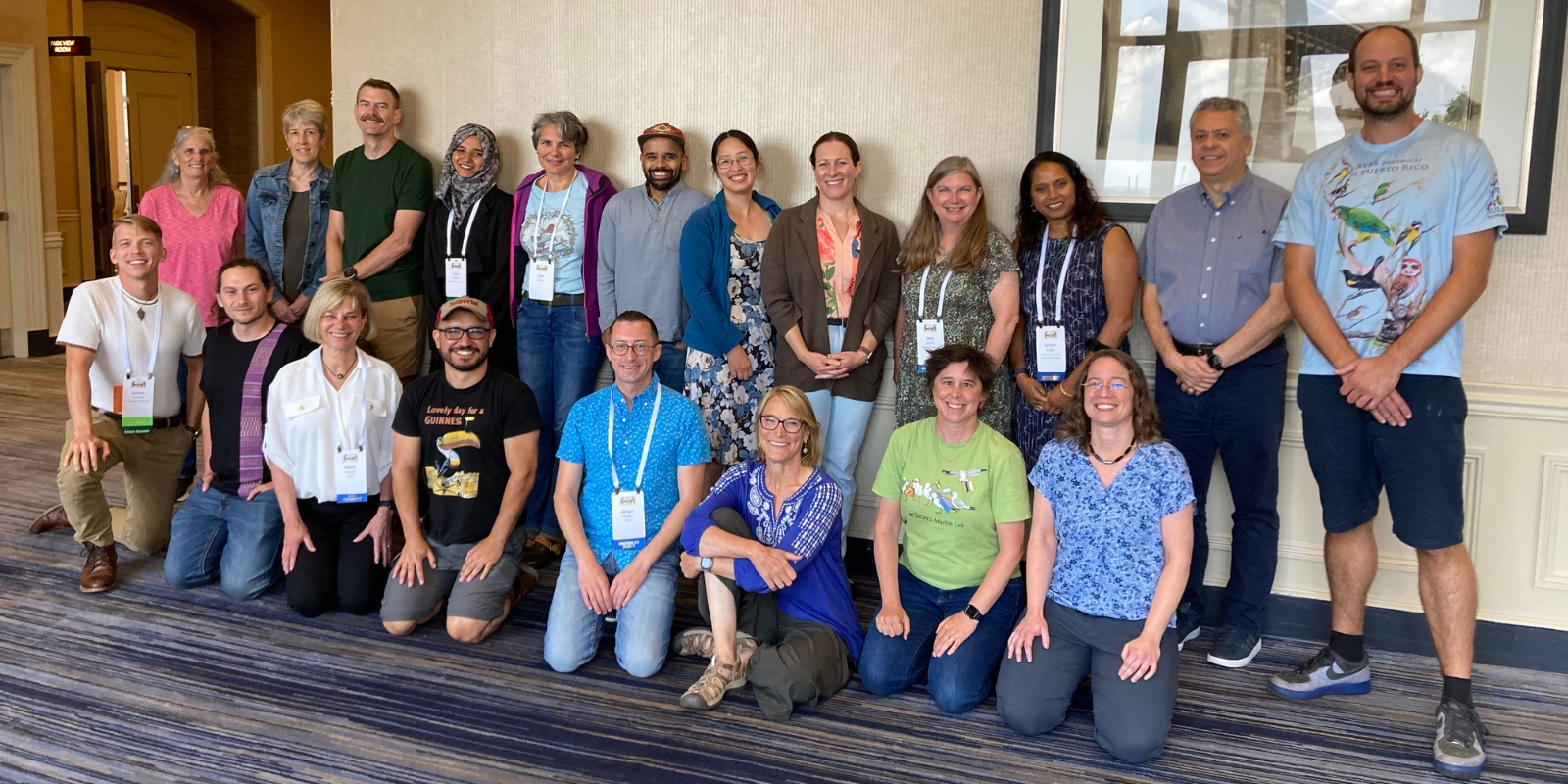2025–2026 Officers and Executive Committee
Sara R. Morris, President (2024–2026)
Morgan Tingley, President-Elect (2024–2026)
Sushma Reddy, Secretary (2022– )
Matthew Carling, Treasurer (2021– )
Judith Scarl, Executive Director and CEO (2021– )
Elective Councilors — Terms ending 2028
Elizabeth Gow
Catherine Lindell
Bette A. Loiselle
Nicholas A. Mason
Elective Student Councilors — Term ending in 2027
Zachery Holmes
We’re thrilled to announce the winners of the 2025 American Ornithological Society (AOS) Council election. The AOS Council is the Society’s governing body, made up of member volunteers. The AOS Council is responsible for organizational governance: It establishes the direction and strategy of the AOS, makes high-level decisions about AOS’s priorities, oversees the sound financial management of AOS’s resources, and ensures legal and ethical integrity of the organization. Voting Councilors include four officers (President, President-Elect, Treasurer, and Secretary), twelve Elective Councilors, two Elective Student Councilors, and the three most recent Past Presidents.
Sara R. Morris and Morgan Tingley stepped into their respective roles as President and President-Elect immediately following the AOS 2024 meeting in Estes Park, Colorado. Sushma Reddy and Matt Carling ran unopposed this year and were re-elected to the offices of Secretary and Treasurer, respectively.
This year, AOS members elected four new Elective Councilors who officially took office immediately following the AOS 2025 Annual Meeting in St. Louis, Missouri. Elizabeth Gow, Catherine Lindell, Bette A. Loiselle, and Nicholas A. Mason were elected as Elective Councilors to serve three-year terms ending in 2028.
The AOS Council also includes two student representatives serving staggered two-year terms. Zachery Holmes was elected by the AOS members to serve on Council from 2025–2027, joining Faiza Hafeez, who began her term in 2024.
Congratulations to these Officers and Councilors! Read more about our newly elected members of Council below, including personal statements and answers to three important questions asked of each candidate in the 2025 election:
- Why are you interested in serving the American Ornithological Society in this leadership position?
- What key interests, experience, or skills would you bring to this position?
- How have your background and experiences prepared you to be effective in a professional scientific society that values diversity?
AOS Officers
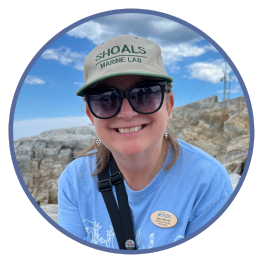
Sara R. Morris
John M. Kingsbury Executive Director of Shoals Marine Laboratory, jointly operated by Cornell University and the University of New Hampshire
Read Sara’s statement from the 2022 election.
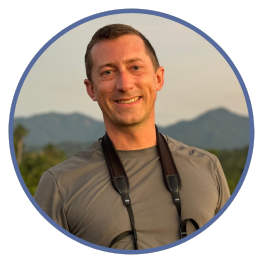
Morgan Tingley
Associate Professor, Department of Ecology and Evolutionary Biology, University of California, Los Angeles
Read Morgan’s statement from the 2024 election.
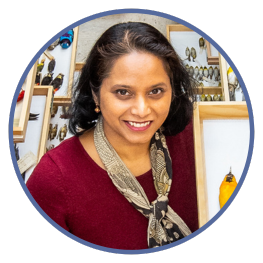
Sushma Reddy
Associate Professor, Breckenridge Chair of Ornithology, Curator of Birds, Bell Museum of Natural History
Read Sushma’s statement.
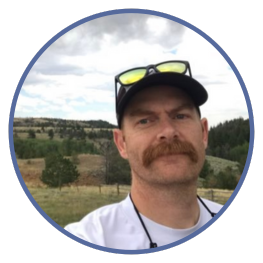
Matt Carling
Associate Professor, University of Wyoming
Read Matt’s statement.
AOS Elective Councilors (Terms ending in 2028)
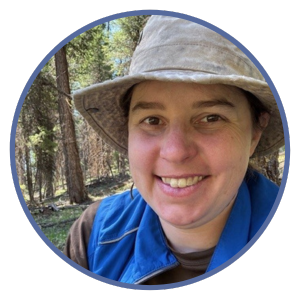
Elizabeth Gow
Research Scientist, Wildlife Research Division, Science and Technology Branch, Environment and Climate Change Canada
Read Elizabeth’s statement.
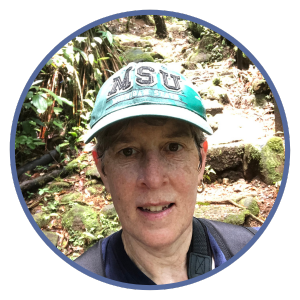
Catherine Lindell
Associate Professor, Integrative Biology Department, Michigan State University
Read Catherine’s statement.
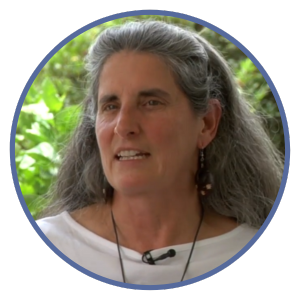
Bette A. Loiselle
Director, Tropical Conservation & Development Program, Center for Latin American Studies; Professor, Wildlife Ecology & Conservation, IFAS/CALS | University of Florida
Read Bette’s statement.
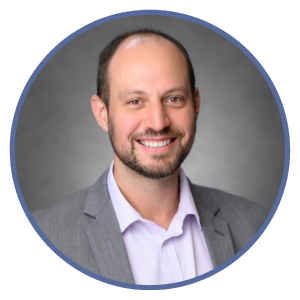
Nicholas A. Mason
Assistant Professor and Curator of Birds, Louisiana State University (LSU) Museum of Natural Sciences
Read Nicholas’s statement.
Student Representative (Term ending 2027)
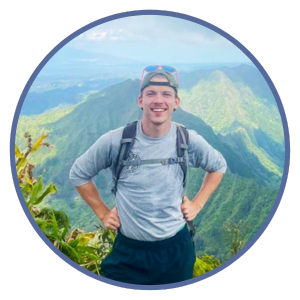
Zachery Holmes
Ph.D. Student, Department of Zoology and Physiology, University of Wyoming
Read Zachery’s statement.
Q&A, Bios, and Candidate Statements
Officers
Sushma Reddy
Associate Professor, Breckenridge Chair of Ornithology, Curator of Birds, Bell Museum of Natural History
Bio: Breckenridge Curator of Birds, Bell Museum of Natural History, Associate Professor, Department of Fisheries, Wildlife, Conservation Biology, University of Minnesota, Twin Cities. Ph.D., Columbia University in the City of New York. Member of AOS since 2002; Elective Member (2011); Fellow (2018), Chair, Meetings Coordination Committee (2020–22); Meeting Coordination Committee (2017–18); Local Organizing Committee (2013); Student Awards Committee (2020). Published in The Auk, Science, Proceedings of National Academy of Sciences, Molecular Phylogenetics and Evolution, Systematic Biology, BMC Evolutionary Biology, Current Zoology, Journal of Field Ornithology, Proceedings of the Royal Society B, Journal of Biogeography.
My research is centered on the evolutionary history of birds with a focus on diversification patterns in the eastern tropics and the early radiation of modern birds. As an educator, researcher, and museum curator, I have a strong interest in promoting natural history collections as a key resource for understanding biodiversity and environmental change. My goals are to continue to support and promote research, education, and outreach activities to advance scientific understanding, public awareness, and conservation of biodiversity.
Why are you interested in serving the American Ornithological Society in this leadership position?
AOS has been the key professional organization that supported me throughout my career trajectory. I continue to be impressed with the variety of people from diverse backgrounds and interests who come together to promote the study and conservation of birds. There is no singular way to be an ornithologist – I believe this is the most important message we can send to create a more inclusive and supportive atmosphere. Diverse perspectives promote excellence and innovation in science and education. In recent years, as I interact with members of varied experiences and backgrounds, I have felt an increased sense of belonging and a responsibility to actively participate in service to AOS. It is often difficult, yet enormously rewarding, to engage in the collective efforts to bring together and facilitate connections across people and disciplines. I would like to continue my service by promoting activities that engage a broader community with a special focus of reaching out to underserved groups. I strongly believe in and work towards advancing the role of science and conservation of birds while building support for current and future ornithologists.
What key interests, experience, or skills would you bring to this position?
I believe my professional career as an ornithologist as well as my demonstrated skills in my current role serving as secretary of AOS and previous role as chair of the Meeting Coordination Committee make me well qualified for this leadership position. As an educator and researcher, I have a keen awareness of the importance of birds for teaching, learning, and caring about the natural world. In my daily activities, I strongly uphold and work towards the mission of the AOS – to advance science and conservation of birds and the scientists who study them. I am proud to help students navigate their scientific pursuits while also encouraging them in public engagement to communicate their work to varied audiences. I am proud to be part of the hard-working team whose efforts bring together our shared passion for birds, science, education, and nature.
How have your background and experiences prepared you to be effective in a professional scientific society that values diversity?
My desire to serve is driven primarily by AOS’s commitment to promoting diversity and inclusion. Advancing science and nature is clearly important but can only be achieved by building a strong community that is diverse, equitable, inclusive, and accessible. I know from my own experiences and hearing others speak about theirs, professional scientific societies can feel impersonal and unapproachable, especially for people of marginalized ethnicities, backgrounds, and genders. Creating a more welcoming atmosphere needs to be an active endeavor. In my efforts for AOS, I strive towards this in multiple ways including by advocating for speakers from diverse backgrounds and experiences; promoting themes relevant to broad audiences; elevating the recognition of women, BIPOC, and early-career researchers; and encouraging policies that broaden participation. Birds have the power to uplift, empower, and advance our scientific and cultural discourses. Through AOS, we can harness this excitement to create a more inclusive and equitable environment for people from diverse backgrounds and abilities.
Matt Carling
Associate Professor, University of Wyoming
Bio: Associate Professor, Department of Zoology and Physiology, and Curator, Museum of Vertebrates, University of Wyoming. Ph.D., 2008, Louisiana State University, Department of Biology and Museum of Natural Science. AOU Member 2003, AOU Elective Member 2013, AOS Fellow 2020. Chair and then Co-Chair of Student and Postdoc Travel Awards Committee, 2014–2021. Chair and then Co-Chair of Student Presentation Awards Committee, 2014–2021. AOS Treasurer, 2021–present. Associate Editor for Evolution, 2016–2017. Rotating Program Officer, Evolutionary Processes, Division of Environmental Biology, National Science Foundation, 2017–2018; 2022–2024. Published in Auk, Condor, Journal of Field Ornithology, Ornithology, Western Birds, Nature, Nature Communications, Molecular Ecology, Evolution Letters, Evolution, BMC Evolutionary Biology, Ecology and Evolution, Conservation Genetics, Molecular Biology and Evolution, Molecular Phylogenetics and Evolution, Journal of Experimental Biology, and Genetics, among others.
My students and I focus on a variety of questions related to speciation and adaptation in birds. Much of this work focuses on using naturally-occurring hybrid zones to study the processes important in generating and maintaining reproductive isolation between closely-related bird species.
Why are you interested in serving the American Ornithological Society in this leadership position?
For me, serving as Treasurer has been a terrific opportunity to help AOS grow in many exciting ways. Moving forward, I am energized by the opportunity to continue to help build and support programs that benefit the whole of AOS. This includes efforts to increase financial support for Ornithologists at all career stages and the on-going work to make AOS a more diverse and inclusive society. I would be honored to continue my service to AOS by remaining the Treasurer.
What key interests, experience, or skills would you bring to this position?
Well, having served as the Treasurer since August 2021, I think I’ve learned a great deal about the skills needed for this position. Certainly there’s more to learn, but that experience, along with previously serving as the co-chair of the student/postdoc travel award program and student presentation award program, has allowed me to work closely with AOS leadership and various AOS committees that will serve me well in my role as AOS Treasurer.
How have your background and experiences prepared you to be effective in a professional scientific society that values diversity?
From 2014 to 2021, I worked hard with co-chairs Morgan Tingley and Jen Walsh, to improve both the travel and presentation awards. This included working with AOS leadership to greatly increase the amount of funding available for travel awards (but we still need more!), streamlining the application processes to make them more transparent and objective, and ushering in more efficient judging mechanisms that have allowed us to greatly expand the number of students competing for presentation awards while still providing feedback to all presentation award competition participants. During these efforts, we engaged both the Diversity and Inclusion and the Student Affairs committees to ensure our policies and procedures would help promote a more diverse and inclusive AOS. Additionally, as Treasurer I have participated in presentations and workshops aimed at promoting diversity and inclusion within AOS.
Elective Councilors
Elizabeth Gow
Research Scientist, Wildlife Research Division, Science and Technology Branch, Environment and Climate Change Canada
Bio: Research Scientist, Wildlife Research Division, Science and Technology Branch, Environment and Climate Change Canada. Adjunct Professor and Associate Graduate Faculty Department of Integrative Biology, University of Guelph. Adjunct Professor Department of Biological Sciences, Simon Fraser University. Adjunct Professor Department of Biology, McMaster University. PhD. 2014. University of Saskatchewan. MSc 2007 York University. Migration Ecologist, Birds Canada 2020–2021. Liber Ero Postdoctoral Fellow 2018–2020, NSERC Postdoctoral Fellow 2016–2018, Killam Postdoctoral Fellow 2014–2016. Published in: Science, Proceedings of Royal Society B, People and Nature, Wilson Journal of Ornithology, Avian Conservation Ecology, Ornithological Applications, Auk/Ornithology, Ecological Monographs, Journal of Field Ornithology, Evolution, Animal Behaviour, Oecologia, Journal of Field Ornithology, among others. Associate Editor of Ornithology (2022–current). AOS member since 2006. Attended ~ 12 AOS meetings. AOS Elected Member 2016, AOS Elected Fellow 2021. James G Cooper Early Professional Award 2015. Society of Canadian Ornithologists Early Career Research Award 2019. Plenary committee 2023 AOS meeting. Early Professional Awards Committee 2016–2023. Society of Canadian Ornithologists (SCO) Equity, Diversity and Inclusion committee member 2022–2023 and Chair 2023–current. Birds of the World/North America Liaison Committee 2018–2023. SCO council member 2024–current.
My research team studies a wide variety of questions related to bird movement, habitat use, reproduction, and conservation in forests in urban areas. Our research also involves working in interdisciplinary teams to understand where, when, and how migratory bird populations are declining including the influence of domestic cats on birds. I currently co-supervise 1 MSc, and 6 PhD students, and have fledged 2 MSc and several undergraduate students.
Why are you interested in serving the American Ornithological Society in this leadership position?
In 2008, I was welcomed into the AOS community as I attended my first meeting in Portland, OR as a MSc student. Since that time, I gained a fond connection with the AOS. This connection developed over the years as I received funding to travel to more meetings and attend its valuable events designed to help students engage with other students and more senior members of the society. As I have moved through life stages from a student to a mid-career ornithologist, the AOS has always been a part of my professional and mentorship community. I want to see the AOS continue to grow in ways that encourage and support students, postdoctoral fellows, and bird enthusiasts from all walks and stages of life, both inside and outside of the academy. Year-after-year I hear from AOS members about the welcoming, friendly, and supportive nature of AOS, and I want to work to maintain this going forward by continuing to build a more inclusive, diverse, and welcoming environment for all ornithologists.
What key interests, experience, or skills would you bring to this position?
I have a wide variety of leadership experience that I believe make me well suited to serve the AOS as a councillor. I have served AOS and a variety of other communities and ornithological organizations in various roles and positions. In particular, I have a strong track record of working towards increasing equity, diversity, and inclusion both within my own research as well as the broader ornithological committee. I have served on the Society of Canadian Ornithologist’s Equity, Diversity, and Inclusion (EDI) committee since 2022, and now chair the committee, and have also served on a departmental EDI committee. I served on the AOS Early Professional Awards Committee for 5 years, where I helped to revise and ensure the awards were more inclusive and equitable. I have experience serving as a councillor for the Society of Canadian Ornithologists and believe there is a lot of benefit that I can bring to the AOS that would help to further build the field of ornithology across borders. I have also received training in conservation leadership through the Liber Ero Fellowship program, including how to lead interdisciplinary teams, facilitate discussions, and work on complex wicked conservation challenges. As a government scientist, I lead and mentor a wide variety of students and other people with a goal of producing and conducting science that addresses the needs of a wide variety of interest groups including First Nations, industry, non-profit organizations, multiple levels of government, and academia, among others. Overall, I bring a diverse background of experience, leadership, and understanding of the multitude of roles ornithologists can play in science, society, and conservation.
How have your background and experiences prepared you to be effective in a professional scientific society that values diversity?
I aim to help build, create, and foster an equitable, diverse, and inclusive environment within the AOS that provides safe and supportive spaces for all ornithologists throughout the Americas and beyond. I have first-hand experience in witnessing the benefits of incorporating diverse views and values into all areas of life and research through my decades of work as an ornithologist. I bring direct experience from serving on EDI committees, intentional time learning and working on identifying my own biases, and working within my own research teams to decolonize and deconstruct past biases and actions that perpetuate inequality. I have learned that creating diverse spaces takes intentional action, a focus on fostering change, followed by lots of consistency, patience, and time to allow for change to happen. These are all necessary for removing barriers of participation, and inclusion which in term create spaces that help to ensure diverse voices are able to have a space at the table.
Catherine Lindell
Associate Professor, Integrative Biology Department, Michigan State University
Bio: My lab group at Michigan State University (MSU) studies the behavior and ecology of birds and how birds contribute to ecological functioning and ecosystem services and disservices. Our venues for this work have included agricultural and forest restoration systems in North and Central America. We investigate how to make managed landscapes more hospitable for native species that contribute significant ecosystem services and less hospitable to non-native species and those that cause ecosystem disservices. Our work has been published in BioScience, Ornithological Applications, Ornithology, Ecological Applications, Journal of Applied Ecology, Biotropica, Agriculture, Ecosystems and Environment, Crop Protection, and Restoration Ecology.
I am currently an Associate Professor in the Integrative Biology Dept. at MSU, having received my Ph.D. from Harvard’s Dept. of Organismic and Evolutionary Biology. I previously served my department as the Graduate Program Director and Interim Chair. I served as Editor-in-Chief of Ornithological Applications from 2019–2024 and as an Associate Editor for Ornithology (previously The Auk) from 2009–2018. I was Treasurer of the Neotropical Ornithological Society from 2008–2011. I have been a member of AOS since the Mesozoic (really 1990) and am a regular attender of AOS meetings, switching off with Ecological Society of America and agricultural conferences. Elective Member of AOS: 2010; Elective Fellow of AOS: 2017.
Why are you interested in serving the American Ornithological Society in this leadership position?
AOS does a great deal of important work, from running fun and exciting conferences, to publishing excellent research, to providing opportunities for members to advance programs important to them, for example early-career awards and grants for Latin American research. I would appreciate the opportunity to work with AOS leadership to continue implementation of our many successful programs. Additionally, I am interested in examining key takeaways from recent events within AOS to potentially improve our decision-making policies and processes.
What key interests, experience, or skills would you bring to this position?
One of my key interests and skills is a focus on implementation. Good ideas are important but they quickly die without explicit plans for implementation and follow-up. I very much enjoyed my work with the EICs, senior editors, and managing editor of the AOS journals because we successfully implemented several important priorities including the name changes of the journals, an Associate Editor Travel Grant program, Special Features, and the opportunity to submit a Collaboration Ethics Statement with manuscripts. This latter innovation was the result of two important articles published in the AOS journals that detailed the ways AOS could facilitate rigorous and accessible research and publication practices (https://doi.org/10.1093/ornithapp/duac046 and https://doi.org/10.1093/ornithapp/duac047). As a Counselor for AOS, I would bring this mindset of implementation to the decisions we make, as well as the focus on making research and publication opportunities, as well as research products, as accessible as possible.
How have your background and experiences prepared you to be effective in a professional scientific society that values diversity?
Much of my research has involved working with private landowners, primarily farmers, in the U.S. and Latin America. Also, in my time as EIC of Ornithological Applications, I worked closely with researchers who reside in Latin America to understand their challenges in publishing in AOS journals. I have learned a great deal from these partners, perhaps most importantly the value of different life experiences and perspectives to developing projects, programs, and organizations that meet the needs of more than just a narrow slice of stakeholders. Keeping and developing AOS as a welcoming and effective organization will continue to involve listening to varying perspectives and integrating these perspectives to meet the needs of our members and to grow our membership. Ultimately, valuing diversity enhances AOS’ ability to meet our mission of supporting avian science and conservation, as well as the researchers and practitioners who produce this science.
Bette A. Loiselle
Director, Tropical Conservation & Development Program, Center for Latin American Studies; Professor, Wildlife Ecology & Conservation, IFAS/CALS | University of Florida
Bio: Ph.D., 1987, University of Wisconsin. M.Sc., 1981, University of Illinois, B.A. 1979, University of Illinois. Published in Auk, Condor, Journal of Field Ornithology, Studies in Avian Biology, Wilson Bulletin, Journal of Avian Biology, Ecology, Oecologia, Behavioral Ecology, Ecology and Evolution, Ecography, Global Ecology and Conservation, Journal of Biogeography, Proceedings of the Royal Society B, Conservation Biology, Biological Conservation, among others. William Brewster Memorial Award 2018. IIE Centennial Medal Award Recipient 2019. Margaret Morse Nice Medal 2020. American Academy of Arts & Science Elected Member 2022. Association for Tropical Biology and Conservation Honorary Fellow 2023. AOS Member 1980-present. Elected Fellow, 2003. Council Member, 2002-2005. Local Co-Chair, North American Ornithological Conference, 1998. Treasurer, Neotropical Ornithological Society, 2003-2008. Member, Finance Committee, 2004–2016. Member, Nominations for Fellows & Elected Members Committee, 2008–2020. Member, Nominations for Officers & Elective Councilors, 2003. Member, Strategic Planning, 2016–2022. Member, Professional Ethics Committee, 2023–present.
My research has focused on tropical bird populations and communities with long-term studies focused in wet forests of Costa Rica (1983–1994) and Amazonian forests of Ecuador (2001-present). Other main study sites have included Atlantic forests of Brazil and Andean forests of Colombia. My research has emphasized the ecology of seed dispersal mutualisms, behavioral ecology of lek-mating systems, and population dynamics and community composition of birds. Currently, our work is investigating long-term trends in bird populations in western Amazon forests that are largely protected from anthropogenic activities that characterize the region (e.g., mining, infrastructure development). Our approach includes systematic surveys and mist-netting in 2 100-ha plots and studies of female visits and male tenure on display courts in lek-breeding manakins annually over the past 24 years. Despite the protected status of this extensive forest, community-wide declines have been observed since 2009. In collaboration with others working on long-term studies in Panama, Brazil, and Costa Rica, we are exploring factors driving bird population dynamics, including the potential role of changing climates. I have mentored over 40 graduate students from Peru, Brazil, Colombia, Costa Rica, Bolivia, Venezuela, Ecuador, Mexico, India, and the US. I have past experiences as Program Officer (2006–2008) and Division Director in Environmental Biology (2010–2011) at NSF, and for the past 13 years, I have directed an interdisciplinary graduate research and training program in Tropical Conservation and Development (TCD) at the University of Florida. Here we work to ensure collaborative spaces to facilitate learning across disciplines, develop knowledge and skill sets needed to address challenges inherent in complex social-ecological systems, work in teams, communicate with diverse audiences and stakeholders, and reflect critically about our own perspectives and actions.
Why are you interested in serving the American Ornithological Society in this leadership position?
I have been a member of the AOS, then the American Ornithologists’ Union and Cooper Ornithological Society, since I was a M.Sc. student in 1980 I consider AOS as one of my two main professional societies; the other is the Association of Tropical Biology and Conservation. Most of my professional service over the years has been associated with AOS, largely because I want to give back to the society that welcomed me and was so influential in my career. Given the challenges we face across many fronts, I want to help AOS confront those challenges, so that we can be an effective, welcoming, supportive, and diverse community with shared vision of advancing the science and conservation of birds.
What key interests, experience, or skills would you bring to this position?
I have conducted field work on birds for over 4 decades, working with students and colleagues from many countries and several disciplines. I have served on advisory boards and committees for conservation NGOs, educational organizations, NSF, AOS and other professional societies. I chair our department’s Inclusion, Diversity, Equity and Access (IDEA) Committee (now rebranded WEC for All), and had leadership roles as Chairs for Faculty Advisory Council in UF’s School of Natural Resources and Environment and NSF’s Committee of Visitors. I actively sought opportunities to improve my own skill sets, but I have also learned by doing. I have co-led three NSF-funded Research Coordination Networks, and research and capacity-building projects funded by Moore Foundation and others. These experiences have been important to helping me facilitate activities and discussions across disciplines and with multi-stakeholder groups. I am passionate about promoting understanding through inter- and transdisciplinary approaches, and building capacity to effectively work collaboratively and embrace our diversity. I would look forward to helping AOS implement activities, policies, and programs that benefit our community, especially students and early career professionals. I also am passionate about enabling all voices to be heard in our society, including those from the global south.
How have your background and experiences prepared you to be effective in a professional scientific society that values diversity?
Throughout my career, I have had the pleasure and honor to work together with students and colleagues from many countries and across different scientific disciplines. I have experienced firsthand the challenges and the incredible rewards of working collectively in diverse teams. Whether it be a working group, committee, research team, lab group, or other team with a task at hand, I feel strongly that we are all leaders in the team. Each person has as part of their role the responsibility to help move the team forward, including listening to others, being open to new ideas, and reflecting on their own perspectives and actions. Effective collaborative work is not easy, but through combined efforts, empathy, mutual respect and trust, together with well-defined roles and responsibilities, we can collectively meet our shared goals. I would be excited to bring my experiences to AOS and hope that I can contribute to lifting up voices and enhancing the scientific and conservation impact of our Society.
Nicholas A. Mason
Assistant Professor and Curator of Birds, Louisiana State University (LSU) Museum of Natural Sciences
Bio: Assistant Professor and Curator of Birds, Louisiana State University (LSU) Museum of Natural Sciences. Ph.D., 2017, Cornell University. M.Sc., 2012, San Diego State University. B.A., 2008, Vassar College. Lead or senior publications in Ornithological Advances (Auk), Wilson Journal of Ornithology, Ornitología Neotropical, Ibis, Journal of Ornithology, Evolution, American Naturalist, Proceedings of the Royal Society B, Ecology and Evolution, among others. Ned K. Johnson Early Investigator Award 2020. AOS Student Presentation Award 2014, 2017. AOS member 2009–present. Elective member, 2017. AOS Fellow, 2025. Chair, AOS Student Affairs Committee 2013–2017, Chair or Co-chair of AOS Early Professional Committee 2018–2024, Member AOS Scientific Programming Committee 2018–2022, Member AOS Collections Committee 2014–Present, Member AOS North American Classification Committee 2019–Present. Attended 14 AOS/AOU/COS meetings.
I am a museum-based ornithologist with broad interests in the evolution and ecology of birds. Research in our lab group at LSU falls into three main categories: (1) comparative and population genomics; (2) phenotypic evolution (focusing on color, song, and morphology in roughly that order of prominence); and (3) human impacts on birds populations. While our research foci are diverse, all of our research leverages museum collections in some way, and I have dedicated my career to the growth and advancement of museums as vital repositories of biodiversity data and academic communities. I currently mentor a diverse group of early-career ornithologists from different backgrounds, while our ongoing research involves collaborations with ornithologists in North America, Latin America, and Europe.
Why are you interested in serving the American Ornithological Society in this leadership position?
I am interested in serving as a council member on AOS to further advance and support the academic society that has most shaped my personal and professional trajectory as an ornithologist. Since discovering my passion for ornithology as a master’s student in 2009, AOS has served as my core community of scientists, providing a network of peers, mentors, and mentees that has enriched my career. As an AOS council member, I would contribute to decision making by listening to constituents across different sectors of ornithology to promote our shared interests. It is a challenging time to be a scientist, which makes it more important that we have a cohesive, organized council to identify priorities and take action that helps ornithologists and the birds we love and study. I’d be honored to contribute to that process in this role.
What key interests, experience, or skills would you bring to this position?
Through my past service to AOS, I have a deep understanding of the structure of our society as well as the current challenges and opportunities AOS faces. As a graduate student AOS member, I led the analysis of a society-wide membership survey that identified key insights as to why ornithologists valued (or did not value) their membership and participating in AOS. As Chair of the Student Affairs Committee and the Early Professional Committee, I solicited input from early-career ornithologists to organize action and events that helps those demographics. Thus, I have prior experience in organizing and acting on behalf of large cross sections of our society. From my experience as a mentor, I have gained a deep appreciation for helping others succeed and would offer council a perspective from a research-intensive R1 academic institution. Finally, as someone who is well-versed in the complexities of working in museum-based ornithology via international field work, I would be especially interested in considering how AOS can interact with other stakeholders to consider changes in policy and permitting regarding scientific collection, import and export workflows, and field work more broadly.
How have your background and experiences prepared you to be effective in a professional scientific society that values diversity?
Growing up in Minnesota, I transitioned from a rural childhood in southern Minnesota to an urban adolescence in the Twin Cities, which granted me an appreciation for diversity from a young age. Now, living in the Deep South of Louisiana, I interact with diverse people that span a broad sociopolitical spectrum while leading a lab group that welcomes and supports ornithologists with different racial and ethnic backgrounds, sexual orientations, socioeconomic statuses, and other axes of human diversity. Science is a collaborative endeavor: AOS’s success hinges on interactions among ornithologists from different backgrounds working together to advance science and the well-being of birds. Similarly, my career path has only been possible through collaborating with ornithologists from a diverse set of backgrounds and identities. My professional experience in ornithology and personal conviction that diversity in experiences, beliefs, and backgrounds improves collaborative endeavors equips me to serve in a professional society that values diversity. As an AOS council member, I would take an even-handed approach to listen to our diverse constituents to find action that benefits our shared goals.
Elective Student Councilor
Zachery Holmes
Ph.D. Student, Department of Zoology and Physiology, University of Wyoming
Bio: Ph.D. Student, University of Wyoming 2025–Present. M.S., University of Florida 2025. B.Sc., University of Florida, 2022. AOS Member: 2022–present; Member Meeting Coordination Committee: 2023–present; Volunteer Subcommittee: 2023–present; BRIDGE/DEI Subcommittee 2024–present; SAFE Meeting Subcommittee 2024–present.
My research takes an interdisciplinary applied approach focused on species and systems of greatest conservation concern, with the aim of filling knowledge gaps on listed avian species success and listed system management or restoration efforts. I aim to understand how species respond to human impact such as management and restoration, land cover conversion and climate change. My goal is to continue to bridge the gap between wildlife scientists and system managers. I currently am conducting field work in Oahu, Hawaiʻi, studying how seed dispersal by non-native avian frugivores shapes Hawaiian forests and previously conducted work on many declining or listed species and systems in Florida. I take pride in my experience of volunteering and working with non-profit organizations both as a participant and leader. I strive to foster teaching and learning opportunities to students of all ages and backgrounds in this field. I have mentored several student interns, led bird banding workshops, orchestrated and planned many public outreach events in previous roles and continue to use my positions to advocate for students in this field.
Why are you interested in serving the American Ornithological Society in this leadership position?
My first AOS conference was in 2022, as a first-year graduate student, and immediately I was impressed and encouraged by the chance to be part of an organization that mirrored my personal and professional values and ethics. Since then, I have jumped at every opportunity to continue to serve the AOS and its mission to advance rigorous scientific progress for the conservation of avian species by supporting the diverse ornithological community. I hope through this position that I can provide a student’s perspective to the society that strives to provide the same opportunity to other students that impressed me on my very first conference. I hope to use my voice to advocate for student needs, grow the ongoing opportunities for student resources and education, and use my leadership experience to help AOS navigate change in the coming years.
What key interests, experience, or skills would you bring to this position?
The most effective leaders in my personal life and professional experience have been those that are able to recognize the skills of others, acknowledge strength in diverse perspectives, communicate effectively and efficiently, and have empathetic yet rational decision-making skills. I emulate these practices in every leadership role I fill and continue to place myself in positions and situations that allow the opportunity to strengthen these skills. From leading field crews, to organizing local conferences, to being in charge of the AOS conference student volunteers, I am very confident with listening and communicating effectively. I have served on multiple DEI committees for non-profits, at multiple universities, and for the AOS BRIDGE sub-committee. I have trained in professional and conservation-based decision-making skills and look forward to applying myself in this role with AOS. Finally, I have worked on several collaborative projects that require effective communication to multiple stakeholders. All these experiences have shaped my ability to identify needs, communicate my perspectives, and listen to others. My two key interests in this position are to grow the opportunities available to graduate students and advocate for ways to increase participation and representation for Latin American ornithologists. Over the past three years I have served on the AOS Meeting Coordination Committee learning how best to serve the AOS, and I look forward to expressing these perspectives in a leadership position.
How have your background and experiences prepared you to be effective in a professional scientific society that values diversity?
What most excites me about serving the AOS is understanding that I am helping an organization that mirrors my own personal values and ethics. The AOS understands that its greatest strength is the diversity of ornithological scientists, their perspectives, and their breadth of work. My previous professional and personal experiences add to this existing mission. As the foundation of ornithological research, graduate students are the future of this field and this society and we graduate students are very diverse. Representation of this diversity is incredibly important. As a member of the LGBTQ+ community, a graduate student, a staunch supporter of DEI, and advocate for ensuring no boundary exists for anyone wanting to enter this field I am proud to offer my perspectives to the AOS. Professionally and personally, I promise that my voice will always be leveraged to ensure all feel welcome to the AOS and to this field.
